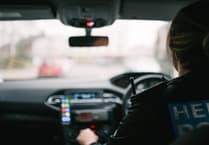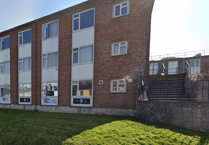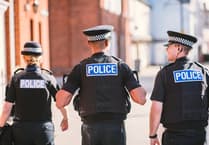A swan has been rescued after being spotted by a RSPCA wildlife officer during a patrol with the police in Milford Haven.
RSPCA officer, Ellie West, was travelling with a Dyfed-Powys Police PCSO as part of Operation Seabird - a campaign which urges people to be responsible around coastal wildlife, when they came across the unwell swan on Thursday, April 14.
The swan was found near the Castle Pill area of Milford, and clearly looked unwell.
Ellie said: “We were getting ready for the action day and planned some leaflet drops and chats with people but we got a little side-tracked as we could see a swan as we drove over the bridge. The tide was out, and she didn’t look right and her neck was flat back on her body.
“I managed to get her to temporarily sit it in the back of the police Land Rover we had been travelling in, and wrapped her in a police coat.
“We then drove back to my van, which was at Neyland Marina, to get the swan contained properly and I then drove her to Tinker’s Hill Bird of Prey and Swan Rescue Centre.
“It was lucky we came across her and the police ride went okay. This was a bit of an usual situation, as you’d never usually see a swan in the backseat of a police car!”
Ellie and Maria of Tinkers Hill in Amroth suspect the swan may have been poisoned accidentally and blood samples have been sent off to check for lead toxicity.
“The good news is that she is eating and drinking and is being well looked after by Tinker’s Hill, who we’d like to thank for their help and expertise,” she continued.
“Sadly it can be fatal if a bird is suffering lead poisoning as a result of ingesting fishing weights or because there was lead in the environment, so we hope she will be okay.
“This is a reminder about how dangerous fishing tackle can be for wildlife. Most anglers are very responsible and dispose of their litter carefully, but it only takes one careless moment and a life such as this can be lost.
“We ask all those who enjoy fishing to follow the Angling Trust’s Take 5 campaign and make use of the recycling scheme to dispose of their waste tackle and line.”
For more information about what to do if you find a wild animal in need of help, please visit the RSPCA’s website.
The current advice, due to the situation with bird flu, is that people shouldn’t try to pick up sick birds themselves, but to contact the RSPCA on 0300 1234 999.
To help the RSPCA continue rescuing, rehabilitating and rehoming animals in desperate need of care please visit the website or call the donation line on 0300 123 8181.





